Related Research Articles

Ecclesiastes , is one of the Ketuvim ("Writings") of the Hebrew Bible and one of the "Wisdom" books of the Christian Old Testament. The title commonly used in English is a Latin transliteration of the Greek translation of the Hebrew word קֹהֶלֶת. An unnamed author introduces "The words of Kohelet, son of David, king in Jerusalem" (1:1) and does not use his own voice again until the final verses (12:9-14), where he gives his own thoughts and summarises the statements of Kohelet; the main body of the text is ascribed to Kohelet himself.

The genealogies of Genesis provide the framework around which the Book of Genesis is structured. Beginning with Adam, genealogical material in Genesis 4, 5, 10, 11, 22, 25, 29–30, 35–36, and 46 moves the narrative forward from the creation to the beginnings of the Israelites' existence as a people.

Matthew 12:11 is the eleventh verse in the twelfth chapter of the Gospel of Matthew in the New Testament.
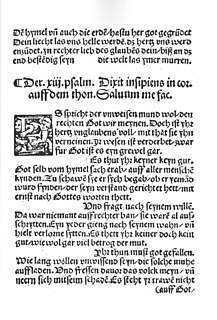
Psalm 14 is the 14th psalm of the Book of Psalms, beginning in English in the King James Version: "The fool hath said in his heart, There is no God." In the Greek Septuagint and the Latin Vulgate, it is psalm 13 in a slightly different numbering, "Dixit insipiens in corde suo". Its authorship is traditionally assigned to King David. With minor differences, it is nearly identical in content with Psalm 53. Hermann Gunkel dates the psalm to the exile period.

Ecclesiastes Rabbah or Kohelet Rabbah is an aggadic commentary on Ecclesiastes, included in the collection of the Midrash Rabbot. It follows the biblical book verse by verse, only a few verses remaining without commentary.
According to the Hebrew Bible, the Asuppim was a location or set of locations in the Second Temple. The word appears to be a masculine plural noun formed of the root אספ gather, and is usually translated "storehouses". The word appears three times in the Hebrew Bible, once in Neh 12:25 and twice in 1 Chr 26. Levite guards were stationed at the Asuppim. In Nehemiah, the guards of the Asuppim are given as follows: Mattaniah, Bakbukiah, Obadiah, Meshullam, Talmon, and Akkub. In 1 Chronicles, the guarding of the Asuppim is given to "the sons of Obed-Edom" who guard it "two by two ". John Lightfoot argues the Asuppim was located along the western wall of the Temple, though David Qimḥi, pseudo-Abraham b. David, David Altschuler, and Alexander Bennett M'Grigor put it to the south.
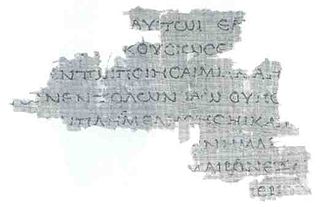
The manuscript 4Q120 is a Septuagint manuscript (LXX) of the biblical Book of Leviticus written on papyrus, found at Qumran. The Rahlfs-No. is 802. Palaoegraphycally it dates from the first century BCE. Currently the manuscript is housed in the Rockefeller Museum in Jerusalem.

Romans 1 is the first chapter of the Epistle to the Romans in the New Testament of the Christian Bible. It is authored by Paul the Apostle, while he was in Corinth in the mid 50s AD, with the help of an amanuensis (secretary), Tertius, who adds his own greeting in Romans 16:22. Acts 20:3 records that Paul stayed in Greece, probably Corinth, for three months.
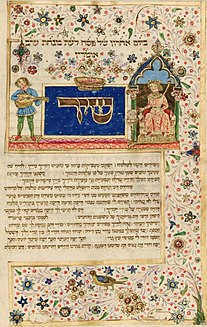
Song of Songs 1 is the first chapter of a book called "Song of Songs" or "Song of Solomon" in the Hebrew Bible or the Old Testament of the Christian Bible. This book is one of the Five Megillot, a collection of short books, together with Book of Ruth, Lamentations, Ecclesiastes and Esther, within the Ketuvim, the third and the last part of the Hebrew Bible. Jewish tradition views Solomon as the author of this book, and this attribution influences the acceptance of this book as a canonical text, although this is now largely disputed. This chapter contains the superscription, songs of the main female characters and the opening song of the male character.
Isaiah 49 is the forty-ninth chapter of the Book of Isaiah in the Hebrew Bible or the Old Testament of the Christian Bible. This book contains the prophecies attributed to the prophet Isaiah, and is one of the Books of the Prophets. Chapters 40-55 are known as "Deutero-Isaiah" and date from the time of the Israelites' exile in Babylon. This chapter includes the second of the songs of the "Suffering Servant".
Isaiah 35 is the thirty-fifth chapter of the Book of Isaiah in the Hebrew Bible or the Old Testament of the Christian Bible. This book contains the prophecies attributed to the prophet Isaiah, and is one of the Books of the Prophets. This is the final chapter in a group which the Jerusalem Bible calls a collection of "poems on Israel and Judah". The New King James Version entitles this chapter "The Future Glory of Zion".

Jeremiah 3 is the third chapter of the Book of Jeremiah in the Hebrew Bible or the Old Testament of the Christian Bible. This book contains prophecies attributed to the prophet Jeremiah, and is one of the Books of the Prophets. Chapters 2 to 6 contain the earliest preaching of Jeremiah on the apostasy of Israel. Verses 2:1-3:5 dramatize the ending of a "marriage" between Yahweh and Israel, whereas verses 3:6-4:2 describe "the aftermath of recrimination" and partial restoration.
Textual variants in the Gospel of Mark are the subject of the study called textual criticism of the New Testament. Textual variants in manuscripts arise when a copyist makes deliberate or inadvertent alterations to a text that is being reproduced. An abbreviated list of textual variants in this particular book is given in this article below.
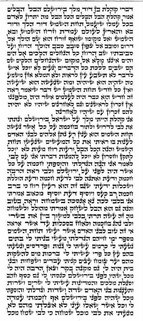
Ecclesiastes 5 is the fifth chapter of the Book of Ecclesiastes in the Hebrew Bible or the Old Testament of the Christian Bible. The book contains philosophical speeches by a character called '(the) Qoheleth', composed probably between the 5th to 2nd century BCE. Peshitta, Targum, and Talmud attribute the authorship of the book to King Solomon. This chapter contains the advice on how to approach God the right way, and the discussion about poverty and wealth.
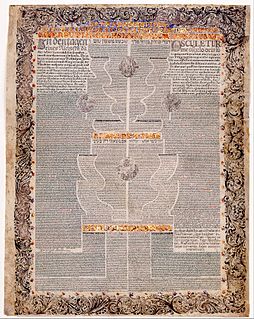
Ecclesiastes 11 is the eleventh chapter of the Book of Ecclesiastes in the Hebrew Bible or the Old Testament of the Christian Bible. The book contains philosophical speeches by a character called '(the) Qoheleth', composed probably between 5th to 2nd century BCE. Peshitta, Targum, and Talmud attribute the authorship of the book to King Solomon. This chapter and the next are characterized by the encouragement to make decision and the need to act speedily.

Song of Songs 2 is the second chapter of the Song of Songs in the Hebrew Bible or the Old Testament of the Christian Bible. This book is one of the Five Megillot, a collection of short books, together with Book of Ruth, Lamentations, Ecclesiastes and Esther, within the Ketuvim, the third and the last part of the Hebrew Bible. Jewish tradition views Solomon as the author of this book, and this attribution influences the acceptance of this book as a canonical text, although this is at present largely disputed. This chapter contains a dialogue in the open air and several female poems with the main imagery of flora and fauna.
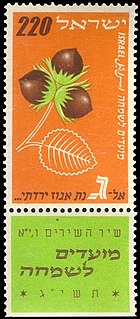
Song of Songs 6 is the sixth chapter of the Song of Songs in the Hebrew Bible or the Old Testament of the Christian Bible. This book is one of the Five Megillot, a collection of short books, together with Book of Ruth, Lamentations, Ecclesiastes and Esther, within the Ketuvim, the third and the last part of the Hebrew Bible. Jewish tradition views Solomon as the author of this book, and this attribution influences the acceptance of this book as a canonical text, although this is at present largely disputed. This chapter contains a dialogue between the daughters of Jerusalem and the woman about the man, followed by the man's descriptive poem of the woman, ending with a collective call to the woman to return.
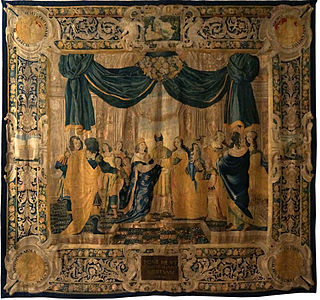
Song of Songs 8 is the eighth chapter of the Song of Songs in the Hebrew Bible or the Old Testament of the Christian Bible. This book is one of the Five Megillot, a collection of short books, together with Book of Ruth, Lamentations, Ecclesiastes and Esther, within the Ketuvim, the third and the last part of the Hebrew Bible. Jewish tradition views Solomon as the author of this book, and this attribution influences the acceptance of this book as a canonical text, although this is at present largely disputed. This chapter contains dialogues between the woman and the daughters of Jerusalem, the woman and her brothers, then finally, the woman and the man.
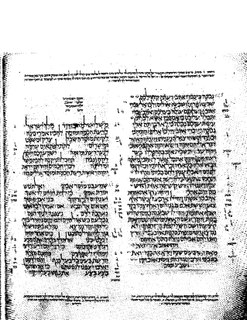
Proverbs 3 is the third chapter of the Book of Proverbs in the Hebrew Bible or the Old Testament of the Christian Bible. The book is a compilation of several wisdom literature collections, with the heading in 1:1 may be intended to regard Solomon as the traditional author of the whole book, but the dates of the individual collections are difficult to determine, and the book probably obtained its final shape in the post-exilic period. This chapter is a part of the first collection of the book.
Textual variants in the Hebrew Bible manuscripts arise when a copyist makes deliberate or inadvertent alterations to the text that is being reproduced. Textual criticism of the Hebrew Bible has included study of its textual variants.
References
- 1 2 "Bible Gateway passage: Ecclesiastes 11:3 - King James Version". Bible Gateway. Retrieved 2022-05-19.
- ↑ "Ecclesiastes 11:3 Interlinear: If the thick clouds are full of rain, On the earth they empty themselves; And if a tree doth fall in the south or to the north, The place where the tree falleth, there it is". biblehub.com. Retrieved 2022-05-19.
- ↑ "Kohelet (Ecclesiastes) 11 :: Septuagint (LXX)". Blue Letter Bible. Retrieved 2022-05-19.
- ↑ "Ecclesiastes 11:3 If the clouds are full, they will pour out rain upon the earth; whether a tree falls to the south or to the north, in the place where it falls, there it will lie". biblehub.com. Retrieved 2022-05-19.
- 1 2 "Ecclesiastes 11:3 Commentaries: If the clouds are full, they pour out rain upon the earth; and whether a tree falls toward the south or toward the north, wherever the tree falls, there it lies". biblehub.com. Retrieved 2022-05-19.